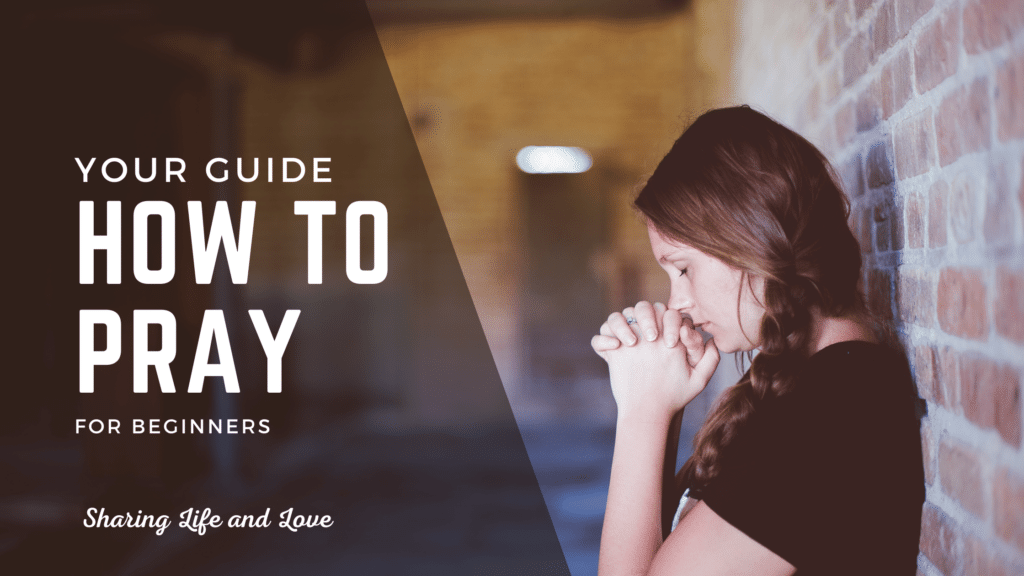In our free Ruth Bible study week 1, we will cover the setting of Ruth. Learning the setting of Ruth in the Bible is critical when trying to understand its elements because this is not your typical love story.
After all, Ruth was not your ordinary Jewish bride. However, (spoiler alert) through God’s redemptive plan, she won the love and respect of two men. You might ask, how? Well, I don’t want to give away too much, so you must wait and see!
This week, our focus will be on the background of the book of Ruth. It was a dark time for Israel, and the family you are about to meet made a peculiar choice and ended up in a foreign land.
As you discover the beautiful beginnings of this story in week one, think about what future generations might say about your setting or background and your reaction to your current circumstances. Is God prompting you to make a change?
How has your background shaped you?
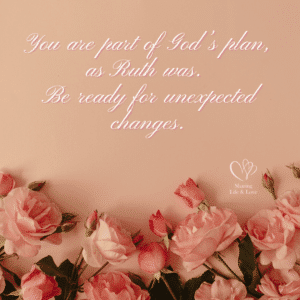
You are part of God’s plan, as Ruth was. Be ready for unexpected changes.
Day 1 – A Time When Judges Ruled
As we begin the book of Ruth, it’s important to understand the circumstances surrounding the Elimelech family. They lived in a day and time that might make you think about how the world is today – where people act as they want to, which is usually not the best way.
This was not what we would think of as judges. Judges were military leaders appointed by our Heavenly Father to lead His people as they navigated their new home – The Promised Land (Canaan). These leaders (judges) were created to rescue the Israelites.
To understand and learn all the details as to why this did not work out as they might have hoped, read Judges 2:16-23. In that passage, you will discover why the people were unsuccessful when judges ruled the land. Be sure to write out all your findings.
Now, read Ruth 1:1. The story of Ruth happened during the time of Judges. Although we do not have an exact date, we are given much context in those first few words. Focus on the first part of Ruth 1:1. Read Ruth 1:1a (See further Bible study tip).
Think about the following question today.
How does the culture you live in affect your relationship with God?
Related: How to Start a Relationship with God
Bible Study Tip:
When reading Bible studies or Bible reading plans, you’ll often see a letter next to a verse. In this particular Scripture, we want to focus on the first part of Ruth 1:1. This would be noted as Ruth 1:1a – meaning the first part of that Bible verse.
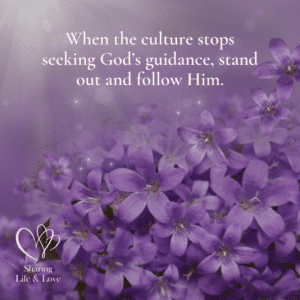
When the culture stops seeking God’s guidance, stand out and follow Him.
Day 2 – A Famine Hits the House of Bread
Today, we will continue the Ruth Bible study week 1, as we look further at the setting of this book of the Bible.
In Ruth 1:1, we discover the family moves to Moab. What’s particularly interesting is the reason they left Bethlehem. There was a famine in the land. Ironically, Bethlehem means “house of bread.” Unfortunately, there was very little bread available.
Let’s look at some other famines that affected God’s people. In Genesis 12:10, we read that a severe famine caused Abram (Abraham) and Sarai (Sarah) to leave the land of Canaan and go to Egypt, where they were foreigners. A similar story can be found in Genesis 26:1.
Read the circumstances in Genesis 43:1-2. As we read on, we discover that the people will have their needs met. Read Genesis 45:3-15.
As you read the Bible today, look at how God provided for His people. He knew their needs. This brings us to the big picture. We can see God’s “fingerprints” all over the stories of those who went through rough times.
How has God provided for you – in good times and bad?
Related: How to Trust God in Hard Times
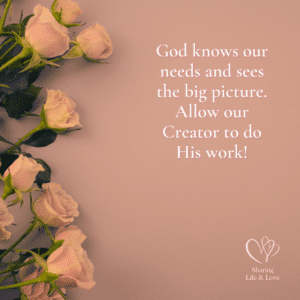
God knows our needs and sees the big picture. Allow our Creator to do His work!
Day 3 – The Move to a New Destination: Moab
At the end of Ruth 1:1 (Ruth 1:1b), we read that a man takes his wife and two children to Moab. It is unusual to move away from your people, but yesterday, we learned why this man decided to move his family. There was a famine in the land.
What is peculiar is the family’s decision to move to Moab. Surely, there were better destinations. Let’s dive into a cultural study to understand why this was an unusual choice for Israelites.
Moabites were pagans and did not worship the Lord of Israel (our God). It was not commonplace for a Jew and a Moabite to marry, but the family moved there anyway with two sons in tow.
Can you imagine what it must have been like to hope for a brighter future in the land of your enemies? They surely faced many uncertainties in how they’d be treated and how they would fit in.
Read Genesis 19:30-38 to see how the Moabites came to be. Isn’t that interesting?
While we can understand why the family would move away when their land had a famine, did they need to move to Moab? Why did they look for greener pastures when others were able to tough out their circumstances?
When have you thought the grass would be greener elsewhere, only to be proven wrong?
Related: 100+ Simple Prayers of Hope

The grass usually seems greener on the other side but rarely is. Make the most of where you are!
Day 4 – Meet the Elimelech Family
Today, in continuing the Ruth Bible study week 1, let’s look at Ruth 1:2-5a. Here, we meet the family. As you may recall from other studies of the Bible, people tended to name their babies after places or events that took place when they were born.
For example, Esau (Genesis 25:24-26) was one of the twins born to Rebekah and Isaac. He came out of her womb all red and hairy. Can you imagine that? He got the name Esau because it meant “hairy.”
Let’s meet the Elimelech family.
We can assume that their names indicated something about them or their parents. Elimelech means “God is My King.” He was the father of this family. What does that tell you?
List the other characters from this story. Research the meanings of their names to get a better idea of who they might have been at birth.
From the names “Sick” and “Puny,” we can conclude that they might have been sick or weak from birth. Although we can tell from the verses that they became old enough to marry and live an additional ten years (verse 4), they did pass away. Who remained?
Naomi was left without a husband or sons.
Have you experienced this kind of piercing loss?
Related: Build Your Faith with 75+ War Room Prayers
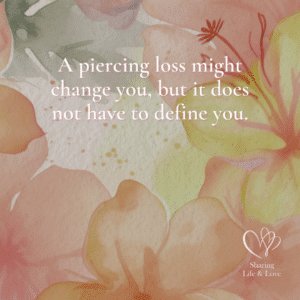
A piercing loss might change you, but it does not have to define you.
Day 5 – Women in Ruth’s Day
As we wrap up Ruth Bible study week 1, in Ruth 1:1-5, we see that Naomi is left along with her daughters-in-law. Today, women often thrive without men, but that was not how things worked in that culture and during that time.
If you’ve studied the culture in the Bible, you know that women depended on men for their survival. A single widow might have been cared for by distant relatives or other countrymen. However, in the case of these ladies, we are talking about three widows!
Do you see why Naomi might have wanted to change her circumstances and return to the place she once called home? We’ll look further into this move in the future.
There were specific rules laid out for widows in the Old Testament. Read Deuteronomy 24. Pay special attention to verses 19-21. What were some of the rules of society regarding widows?
Have you experienced anything like this from the kindness of others?
If you feel like you are “slipping through the cracks” or have no one kind like this to you, you might try switching roles and adjusting your expectations. When we spread love and kindness, it blooms in our hearts and souls.
Mother Teresa said, “Let no one ever come to you without leaving better and happier.” Do you have relationships with others that make them better and happier?
Treat others as you would like to be treated (Luke 6:31), even if it’s undeserved!
How have you shown kindness? How will you?
Related: Show Love to Others Through Volunteer Work

When we spread love and kindness, it blooms in our hearts and souls.
Ruth Bible Study Week 1: Setting of Ruth – Biblework for Days 1-5
For Ruth Bible study week 1, in each day’s Biblework, you will be given the verses from that day’s study to read. Those verses will need to be read for the day. There will be additional reading in God’s Word that you should also aim to do.
Please note: Some questions will come from both places – today’s verses and additional verses.
Day 1 – Biblework
Today’s Verses: Judges 2:16-23; Ruth 1:1
Read the following additional verse(s): Joshua 1:5; Judges 19:1; Psalm 106:44-46
Answer these questions:
- Why did the people of Israel suffer in the days of Judges?
- How did the people act in disobedience to the Lord in Judges 2?
- How did the Lord react to their disobedience?
- In what ways has God rescued you?
- How could you rely more on God and less on the world?
Day 2 – Biblework
Today’s Verses: Genesis 12:10; Genesis 26:1; Genesis 43:1-2; Genesis 45:3-15; Ruth 1:1
Read the following additional verse(s): 2 Samuel 21:1; 2 Kings 8:1; Job 5:20
Answer these questions:
- Who was affected by the famine in Genesis 26?
- How was this character related to Abraham?
- Have you been richly blessed? Explain.
- How do you show gratitude to God?
- Write a prayer of gratitude to God for providing for you during a time of need.
Day 3 – Biblework
Today’s Verses: Genesis 19:30-38; Ruth 1:1
Read the following additional verse(s): Numbers 22; Deuteronomy 23:1-8; Judges 3:12-30
Answer these questions:
- Who were the people of Moab? Why were they considered to be an enemy?
- What were the names of Lot’s grandsons?
- What became the names of the nations?
- When have you looked for the easy road over the tough reality?
- What obstacles might the family have faced in moving from Judah to Moab?
Day 4 – Biblework
Today’s Verses: Genesis 25:24-26; Ruth 1:2-5a
Read the following additional verse(s): Psalm 34:19; Psalm 89:30-32; Philippians 3:12-14
Answer these questions:
- List the characters from Ruth 1:2-5 and the meaning behind each name.
- What do the names tell you about the characters?
- Why might it not be wise for the sons to get married in Moab?
- What would their names be if you were to name your children exactly what you thought of them at birth?
- How might Naomi’s loss have shaped her path in the future? Can you imagine her pain?
Day 5 – Biblework
Today’s Verses: Deuteronomy 24; Ruth 1:5; Luke 6:31
Read the following additional verse(s): Matthew 5:3-10; Matthew 7:12; Matthew 25:34-40
Answer these questions:
- Besides widows, who else received special treatment in Deuteronomy 24? What were the specific stipulations?
- Do you believe this treatment was fair for the less fortunate?
- How is our treatment of widows different today than it was then?
- What could you do today to impact the life of a widow?
- How has going through a loss positively impacted you?
Digging deeper into the Word allows you to stretch yourself and deepen your faith!
Ruth Bible Study Week 1: Setting of Ruth – Digging Deeper Days 1-5
The Digging Deeper section will give you a bonus activity where you will take a closer look at the lesson, viewing it from a different angle. While optional, you will learn more and grow further by doing as much as possible. Typically, you get out the effort that you put in!
Day 1 – Digging Deeper
Since this book tells us in the beginning that the events occurred in the time of judges, do some research in this area. Who were the judges listed in the Bible? As you make a list, write down a one-sentence summary for each judge in your notes or Bible.
Day 2 – Digging Deeper
A famine was similar to involuntary fasting. Read Amos 8:11 to learn of a different type of famine. What did the Lord say about the kind of famine that would be unleashed on His people? List the details of this famine. When and how long did it last? Was it better than no food?
Day 3 – Digging Deeper
Draw a map of Israel from that time in your notes, or print one if not already in your Bible. Locate Bethlehem in Judah, the Dead Sea, and the country of Moab. What challenges might this family have faced in traveling this distance? Chart the course you suspect they took.
Day 4 – Digging Deeper
When we get to Ruth 2, we meet a new character who plays a critical role in this story. In fact, he impacts OUR future, but let’s not get ahead of ourselves. What is his name, and what does his name mean? What does this indicate to you?
Day 5 – Digging Deeper
In the cross-reference verses today (Matthew 5), you read what is known as “The Beatitudes.” List the types of individuals from this passage and what each will receive. Which ones can you give an example of without much thought? Where do you fall on this list?
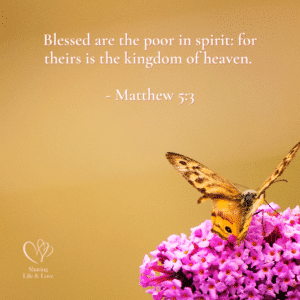
Blessed are the poor in spirit: for theirs is the kingdom of heaven. – Matthew 5:3
Additional Bible Study Resources
Use Bible Study Resources to enhance your time with God. Additional help with your Bible study is available in the Bible study category of our Spiritual Growth area. We hope God blesses your time with Him as you learn more about His Word.
More Sharing Life and Love Bible Studies
How to Build a Quiet Time with God – In this 8-week Bible study, you will walk through the book of Psalms. Additionally, you will create a valuable time with God that will be impactful.
How to Find Your Spiritual Calling – This 6-week Bible study walks you through how to discover what God has called you to do.
Create Your Own God-Centered Goals – In this 5-day Bible study, you will enjoy learning about goals and how to create ones that are centered upon the Lord.
Join the Community!
You can join our Facebook community, the Sharing Life and Love Sisters Bible Study Group, if you would like to watch live videos that walk through various Bible studies. Our community is for ladies only and is called the Sharing Life and Love Sisters Bible Study Group.
Ruth Bible Study Week 1: Setting of Ruth Conclusion
In the Ruth Bible study week 1, you have studied the setting of Ruth in detail. While the time was not ideal for Israel, a few characters did make the most of their circumstances, which you will learn in the upcoming weeks as we continue the free Ruth Bible study.
As you walk away with a few takeaways under your belt, how will you allow the setting of Ruth to change you? What actions will you take? Make a plan and stick to it! You’ve got this!
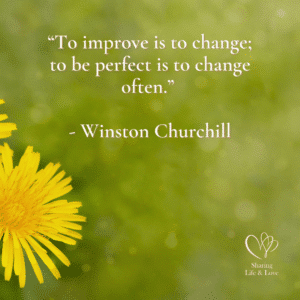
“To improve is to change; to be perfect is to change often.” – Winston Churchill



